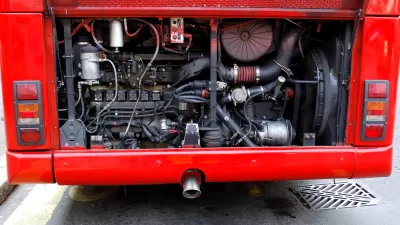Three whammy’s are pressing America’s luck this spring as the nation engages in one of the most exciting presidential elections in my lifetime. The problem is that the only solution that has been proposed at the national-level has been a gas tax holiday. A gas tax holiday would have the effect of starving our increasingly troubled transportation system of the necessary funds to maintain and improve infrastructure and service.
Three whammy's are pressing America's luck this spring as the nation engages in one of the most exciting presidential elections in my lifetime. The problem is that the only solution that has been proposed at the national-level has been a gas tax holiday. A gas tax holiday would have the effect of starving our increasingly troubled transportation system of the necessary funds to maintain and improve infrastructure and service.
I would love to see a presidential debate about the future of transportation in America. This debate would address the three whammy's facing transportation in America:
Whammy # 1 – Rising fuel costs
Rising fuel may come as a shock to Americans but some have seen this day coming for a half century. In 1956, Dr. Hubbard, a geologist for Shell, predicted that American oil would peak in 1970. Dr. Hubbard was correct. He also predicted that global oil production would peak around the year 2000. Due to the oil shock in the late 1970s, which resulted in less fuel consumption, the peak was delayed by nearly a decade. It appears that Dr. Hubbard may be correct a second time.
The problem is that America is ill prepared to leave our vehicles at home. Most suburbs and towns have been designed with low-density land uses, which do not support public transit, walking, or bicycling. Despite this, American's are using transit in record numbers. Park-and-rides are overflowing and buses and trains are full.
Whammy # 2 – Transit agencies cannot afford fuel
Across America, transit agencies have to cut service at a time when we need transit more than ever before. This is because the cost of fuel is outpacing farebox revenues. This insult to injury hurts working class Americans the most. In recent weeks Miami and Denver announced major service cuts to their transit system. Unfortunately, more transit systems are sure to follow unless the federal government steps in and provides some financial relief.
Whammy # 3 – Gas and sales tax revenues are down
A major source for funding transportation service and infrastructure comes from gas and sales taxes. The federal government, as well as many state governments, collect gas taxes to fund transportation capital improvements. Many cities use a sales tax to fund transit operations. As increased fuel prices pinch our economy, people spend less, thus resulting in fewer gas and sales tax revenues to support our transportation system.
These three whammy's are resulting in a downward economic spiral that needs presidential attention.
The problem with America is that we have lost our vision. The post-WWII generation, emerging from turbulent times, had high hopes for a better future. This future focused on how transportation and new development patterns could improve the lives of the average working class American. The outward expansion of highways and suburbs of the 1950s, '60s and '70s provided mobility for a growing economy.
Fifty years later, we once again need a national hope for how transportation and new development patterns can improve our lives. This time the hope is for creating a balanced, multimodal transportation system with cities designed for walking, bicycling, and public transit. Our hope for the 21st century is to reuse what we have overlooked. We need to embrace a new green economy that creates solutions beyond fossil fuels. The green economy of the 21st century will be based on using our resources better and minizing waste.
Unfortunately, none of this is possible without money and a vision. Rather than discussing how a gas tax holiday can help America for a few months this summer, we need our presidential candidates to begin a real discussion about how our country can create a sustainable transport system for the 21st century.


Alabama: Trump Terminates Settlements for Black Communities Harmed By Raw Sewage
Trump deemed the landmark civil rights agreement “illegal DEI and environmental justice policy.”

Study: Maui’s Plan to Convert Vacation Rentals to Long-Term Housing Could Cause Nearly $1 Billion Economic Loss
The plan would reduce visitor accommodation by 25% resulting in 1,900 jobs lost.

Why Should We Subsidize Public Transportation?
Many public transit agencies face financial stress due to rising costs, declining fare revenue, and declining subsidies. Transit advocates must provide a strong business case for increasing public transit funding.

Wind Energy on the Rise Despite Federal Policy Reversal
The Trump administration is revoking federal support for renewable energy, but demand for new projects continues unabated.

Passengers Flock to Caltrain After Electrification
The new electric trains are running faster and more reliably, leading to strong ridership growth on the Bay Area rail system.

Texas Churches Rally Behind ‘Yes in God’s Back Yard’ Legislation
Religious leaders want the state to reduce zoning regulations to streamline leasing church-owned land to housing developers.
Urban Design for Planners 1: Software Tools
This six-course series explores essential urban design concepts using open source software and equips planners with the tools they need to participate fully in the urban design process.
Planning for Universal Design
Learn the tools for implementing Universal Design in planning regulations.
Caltrans
Smith Gee Studio
Institute for Housing and Urban Development Studies (IHS)
City of Grandview
Harvard GSD Executive Education
Toledo-Lucas County Plan Commissions
Salt Lake City
NYU Wagner Graduate School of Public Service




























